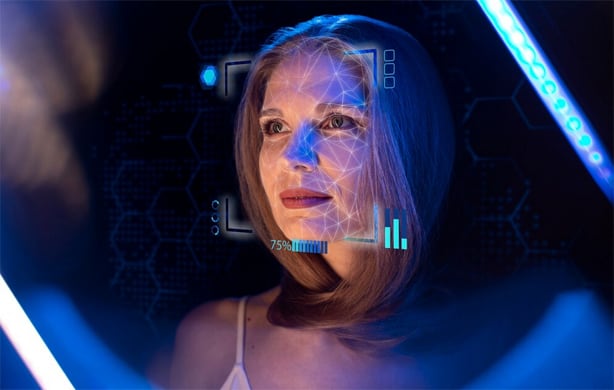
Facial recognition search engines can quickly find faces in a large database of videos and images based on their analysis of the searched face. Facial recognition search engines use advanced technology to analyze and compare faces based on their unique patterns and features.
In addition, these search engines provide consumers with a fresh method of exploring the internet. In the past, we used verbal descriptions, like names, to gather information about people or products. Today, a picture or visual is all you need, thanks to face recognition search engines.
Let’s explore a few face-recognition search engines in this article. Here is a quick list of the top search engines that allow you to find a person’s internet information using their photo.
12 Best Facial Recognition Search Engines in 2024
These facial recognition search engines are top-notch. Additionally, I have provided details on the functionality and applications of these items towards the conclusion of this compilation.
1. PimEyes
PimEyes is a search engine that uses reverse image search to find images or faces on millions of websites (10 million, according to the website). It quickly built a strong reputation.
The search engine rapidly retrieves information about any image from its vast image database. If you’re looking for pictures of celebrities, it works perfectly. The results will be precise, and the collection will consist of nearly 1 TB of fresh images.
PimEyes offers free and paid options, which is essential to note in this context. Nevertheless, using the free-to-use option enables you to verify the presence of the images on the internet. In addition, the other features, such as Deep Search, PDF creation, and accessing outcomes on online sites, are only available with a paid subscription.
2. Social Catfish
It’s essential to be careful when interacting with new people online, as there are many deceptive individuals and false information. Social Catfish makes the entire process more user-friendly by providing you with all the relevant data related to the image you uploaded on their platform.
Social Catfish is a top-notch tool for reverse image searches. One great aspect of the tool is its ability to provide information based on a picture and other criteria like emails, names, phone numbers, and addresses. It is incredible!
In addition, the service is not free, but you can pay for a 5-day trial period before deciding on a full membership.
The application scans image metadata and device information, searches for scammers’ identities on social media platforms, and provides additional features—Just a reminder: accessing information about a single image requires payment.
3. Betaface
Betaface is a versatile tool used for various professional or personal purposes. It offers an engaging and enjoyable experience. When you upload a photo or an image URL, the face will be enclosed in a rectangle. After that, a series of dots will appear on the face to analyze different aspects such as age, attractiveness, facial expressions, and emotions.
This tool can be used for demonstration purposes, but it is not available for free. Once you’ve uploaded a photo, you’ll find buttons to compare faces, search for famous individuals, and access Wikipedia. You can use the tool to upload multiple files at once and compare images easily. We use a system categorizing faces based on 101 pro facial features and 22 essential facial points.
It would help if you gave this tool a try. Who knows, you might even find your famous look-alike! I’m interested in learning about my well-known look-alike.
4. FaceCheck.id
FaceCheck.id features a user interface that is both unique and vibrant. With the help of artificial intelligence, you can easily access a person’s social media and web accounts by simply using their image. I found it fascinating to view someone’s criminal history if they have one.
This website is often crowded, so you may have to wait in line. Indeed, you heard correctly. However, there is more to it. Before submitting a photo, it is essential to acknowledge that the information obtained from this website should not be used to confront, harass, stalk, or blackmail anyone.
For example, I researched information online using a visual aid. My experience started with a frustrating wait of 45 requests. It took a whole 10 minutes before it was finally my turn. I felt let down because none of the results were relevant to me. There is no suggestion that the website is untrustworthy. Search for any celebrity and get precise results.
5. TinEye
TinEye is a facial recognition search engine that uses reverse image search to provide precise outcomes. According to the website, they have developed highly efficient and accurate picture recognition APIs. Searching for images is a breeze, with the option to paste URLs or upload images.
I decided to try it since they claimed to be the quickest and most precise in the world. I tried it out with my photo, but unfortunately, I didn’t get any results. In the future, when I’m more well-known! After snapping a photo of Dwayne “The Rock” Johnson, I quickly received 38 image-related results in under a second.
Based on my experience, TinEye lives up to its claim and is worth considering. Moreover, you can quickly utilize it on your phone or PC to save time and space.
6. Image Raider
Image Raider is designed with a user-friendly interface and a clear objective, making it a convenient and efficient image recognition tool. The website focuses on catering to legal companies, photographers, and developers. Despite being a premium service, you can try it out for free to determine its value. If you value the comprehensive features, you can choose a plan that perfectly fits your company’s needs.
Once again, I’m curious and eager to test the tool. I began with the image of Dwayne Johnson that I previously used. Furthermore, I completed a captcha test to prove my human identity (for obvious reasons). I quickly found more than 30 results related to the image. It’s important to mention that the image’s data is sourced from a public database, and the tool cannot guarantee its accuracy.
7. Google
Google offers many features, including image search, to enhance your internet experience. It’s completely free and provides accurate results. Unfortunately, the image search tool does not utilize facial recognition when searching for photos. Additionally, it can assist you in locating similar images.
Locate the camera icon in the search bar and drag your image there to begin using Google Image Search. Furthermore, users can easily download the image from their computer by clicking the icon. You have the option to paste the URL. Google will create a mathematical model to find the most similar files using the visual data it has received.
8. Yandex
If you’ve ever used it, Yandex is similar to Google’s image search. When you upload the image, you’ll get several pieces of information. The data contains information about the person’s facial recognition, clothing, and other details.
You’ll get numerous results based on the image, which can be a downside in my experience, and at times, it seems unnecessary. Finally, the tool can quickly search images, helping you save time. You can have numerous matching elements in the image and view similar images to the one you uploaded.
9. Bing
Now is the moment for the Giants to be added to the list. With Microsoft’s powerful image recognition technology, Bing can quickly identify various images and deliver fast results. Whether you upload photos from your device or add image URLs, you’ll receive numerous results rapidly. In addition, it doesn’t cost anything.
The search engine has transitioned to a new name, Microsoft Bing. Improving image search was a key focus of the search engine’s rebranding efforts. You can view the results from the Bing image search in multiple tabs, allowing you to navigate between different pages easily.
10. Spokeo
Spokeo has been operating as a data aggregator and people search engine since 2006. The database contains over 12 billion records that accurately identify individuals and provide relevant information about them. Their database is constantly updated and includes vast information, including over 6 billion consumers, 130 million properties, 600 million legal records, and access to more than 120 social networks. It makes it an excellent people search engine for personal and business purposes.
Spokeo also offers plans for companies to generate leads and acquire customers easily. Enterprise plans provide valuable information, including real estate value data, healthcare estimates, debt information, and e-commerce patterns.
11. Berify
At Berify, we use special algorithms and searching techniques to create a unique solution for conducting facial recognition searches. Using its algorithm and gathering results from popular search engines like Google, Yandex, and Bing increases the likelihood of finding relevant images by providing a comprehensive list of potential matches.
Photographers, content creators, and artists can easily monitor the usage of their intellectual properties on the internet. They are promptly notified of any unauthorized use and can take appropriate action. Results can be quickly sorted and filtered to meet your needs and use case.
12. NeoFace Watch
Many state governments rely on NeoFace Watch for top-level security. Tracking individuals and identifying potential dangers is made simple. NeoFace Watch is a powerful facial recognition software that helps identify international offenders who are difficult to trace.
It provides accurate matching, making it perfect for adjusting posture angles when looking for a face. One of the software’s standout features is its compatibility with a wide range of cameras, ensuring comprehensive coverage. NeoFace Watch can send instant notifications and access stored photos and videos for playback.
It offers basic features and enables face recognition in a group of people. NeoFace ensures precise identification even in situations with low-quality images. Despite the limited number of pixels in the image, it can still provide accurate information.
Now, let’s talk about how face recognition search engines are shaping the future of internet browsing.
Facial Recognition Search engines are becoming increasingly essential for navigating the vast expanse of the internet.
Most people around the globe are active users of social media. Social media is available to everyone regardless of your status, making it easily accessible. Every day, countless images are shared and uploaded on the internet. With internet visual consumption growing at such a rapid rate, advancement in technology is necessary. Thanks to reverse image searching, face recognition has become a precious tool for identifying a person’s profile based on their images. Face recognition technology (FRT) is now widely used in the public and private sectors. FRT is essential for quick and convenient identification, like Face ID, without a password. Are you curious about how facial recognition search works? Alright, here’s a response for you.
How does a Facial Recognition Search Engine work?
Pattern recognition is a fundamental aspect of the human brain. The possible result gave the idea to share these pattern recognition abilities with robots, a.k .a. artificial intelligence. Face recognition tasks have gained significant importance in the field of AI.
The FRT work algorithm consists of two processes: identification and verification. In the initial stage, the person establishes their identity, while their claimed identity is authenticated in the subsequent stage.
Is Facial Recognition Search Engines Useful?
Face recognition search is a versatile tool used in many different fields. Nevertheless, it is crucial to employ this technology ethically.
There are various applications for face recognition search, such as:
1. Examining images to find missing persons is a valuable tool for families and law enforcement agencies in their search endeavors.
2. We are helping law enforcement identify suspects caught on surveillance footage, making capturing and prosecuting them easier.
3. Facial recognition is widely used in surveillance systems, often found at airports and train stations. It enables quick and real-time identification of individuals.
4. Facial recognition search engines are ensuring the authenticity of individuals in images, making identity verification for passports and other crucial documents easier.
5. Facial recognition search engines are protecting intellectual property rights through detecting and responding to unauthorized use of copyrighted images.
6. Social media platforms utilize facial recognition search to provide photo tagging suggestions and identify similar faces in user-uploaded images.
7. Facial recognition technology confirms identity for secure access to devices, premises, or confidential data.
Conclusion
The internet is a valuable resource that is constantly expanding in today’s world. In the future, getting information about any individual should become more accessible, even though finding information on famous individuals is currently more accessible. I found all the tools mentioned above to have advantages and disadvantages, but I enjoyed using them.



